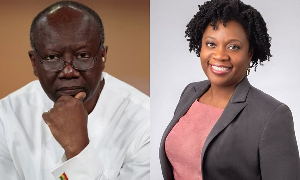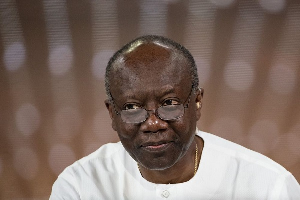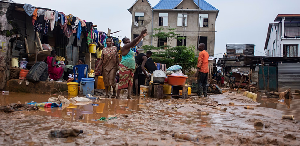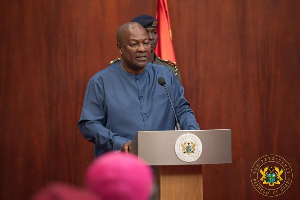“Education is the passport to the future. For tomorrow belongs to those who prepare for it today.” - Malcolm X
Ghana is embarking on a quest to prioritize education as a tool for transformation. How far along are we on this most noble path?
“Education” has been a major issue in previous elections and has become the flagship initiative of the new government.
Free basic education has existed for a long time in well-developed countries. The phenomenal advancement of those countries alone should spur us on towards the imperative task of providing free basic and SHS education for all Ghanaian children.
Not only must the education be ‘free’ but it must be of the highest quality and standard possible so our children can contribute productively and positively within an increasingly globalized workforce.
The implementation of this policy has started with some unavoidable challenges, and our collective resolve is required to sustain it in the national interest.
The relevant authorities may pay attention to the following among the numerous policy options at their disposal:
Supervision of Schools
Lack of adequate supervision over many decades has contributed to the steady erosion of teaching and learning standards in our public school system.
Our senior citizens will confirm that regular and unannounced visits to schools in the past by “School Inspectors” served as an effective check on the teacher-student environment.
A drive around some schools, especially in the rural and remote areas, reveals that school hours are too often spent on outdoor activities such as sports, weeding and other menial activities at construction sites or farms. The end result is some public schools are failing our children who complete JSS and still cannot read or write.
Supervision must include inspection of facilities, teaching methods, teacher and student compliance with attendance and punctuality standards, as well as application of sanctions on errant teachers and students.
The creation of well-functioning school boards for each school, comprising parents, administrators, teachers, even students, can strengthen the overall accountability mandate of public schools.
The educational authorities can create social media handles/helplines to empower parents and communities to report any lapses in the school system. The Honourable Minister of Education and his management team may consider adding an element of regular unannounced visits to schools.
Supervision may also be outsourced through Public Private Partnership (PPP) arrangements in an effort to inject fresh ideas and approaches to managing our public schools.
Involve police, expand their mandate
Our nation’s forward march will be hampered if we cannot enforce attendance and enrollment in schools. Consider the heavy toll widespread illiteracy and ignorance has levied on our national aspirations! Our nation offers free basic education and yet school-age children still loiter about on the streets and in communities.
How can we expect to move forward when a significant percentage of our children stand on street corners begging or selling chewing gum, carry heavy loads in the markets, or are used to provide free farm labour? It is time to establish – and enforce -- a binding social contract that there is no longer any excuse for children to stay out of school.
We must expand the mandate of the Department of Social Welfare as well as law enforcement agencies to sanction irresponsible parents and truant children. Indeed, we must institutionalize a policy to hold accountable those parents/families who do not ensure their children attend school.
Curriculum Review
Our changing world requires a review of our school curriculum. Proper education must deepen the nexus between what is taught in the classroom and its practical application in the ‘real world’. The new curriculum should accentuate critical thinking and problem-solving skills that will equip our youth to face the myriad challenges our country faces.
Why, for example, after all these years of zoological and botanical studies, we here in Ghana cannot establish well-functioning zoos, nature parks and gardens as we see elsewhere? How prepared are our Agriculture students to improve upon traditional farming practices?
Despite the survey, planning and civil engineering departments in our education system, can we state that all towns, cities and villages are expanding in accordance with a well-defined plan?
Social Benefits
The free education policy will come at a cost and in order to derive the full societal benefits, the school system itself must instill ‘life lessons’ that are critical to our progress. Respect and care for the environment, a responsible and productive work ethic, punctuality, peaceful conflict resolution, service to others, and personal integrity and responsibility are ideals that should be modeled for children by parents, community members, teachers, and administrators. The ‘new Ghanaian’ must be taught to believe that no one else can make our country better than Ghanaians themselves.
The Role of the Diaspora
Ghanaians who have earned teaching degrees overseas or who have worked in advanced nations for a length of time should be encouraged to return home to assist as teacher trainers, teachers, and administrators. Retirees who have served in various sectors should also be encouraged to impart their skills to the youth. These individuals can serve as inspiring role models for students.
New sources of funding
The free education policy is going to be a very expensive national project, but the simple answer to the naysayers is the wise adage “if you think education is expensive, try ignorance”. Additional avenues will have to be explored to provide back-up support to the central government in the provision of adequate funding for education. The district, municipal and metropolitan assemblies (MMDAs) with possible contributions from religious bodies as well as old student groups could be counted upon.
Real estates sector
There is large revenue potential in the real estate sector of the country. An education tax is required in all real estate transactions and when adopted contracts, purchase, lease and tenancy agreements could only be sealed with proof of payment of the proposed tax.
Development partners
Enough signals have been given to move the country beyond foreign aid. However, we can call on our development partners, especially the migrant-receiving nations, to assist with our national priority to improve the quality and accessibility of education.
Challenges
A major identified challenge is lack of ICT infrastructure and application within the school system, especially in rural areas. Another hurdle is the burgeoning student populations in the larger second cycle schools. Many more sacrifices are needed for facility expansion in existing institutions alongside the establishment of new fully equipped second cycle institutions in each constituency or district.
Conclusion
In conclusion, every Ghanaian has their perspectives on the big issues of our time, but we are all agreed that the seeds of a prosperous, inclusive, secure society we want for our children tomorrow must be planted today. And those seeds begin to take root in the nutrient-rich soil of a quality education available to all our children as prescribed not only by our 1992 Constitution but also as envisioned in the A.U. Agenda 2063 and Sustainable Development Goals (SDGs) - “Ensure inclusive and equitable quality education and promote lifelong learning opportunities for all”.
“An investment in knowledge pays the best interest.” – Benjamin Franklin
Opinions of Saturday, 9 December 2017
Columnist: Mawutor N. K. Alifo















